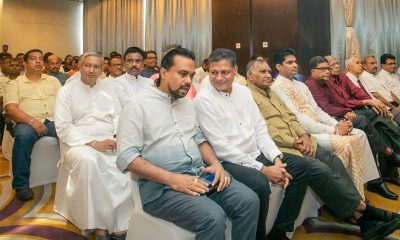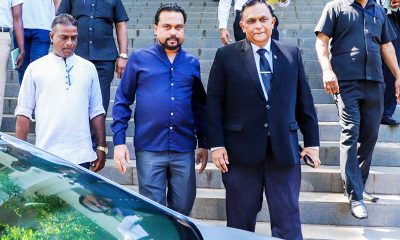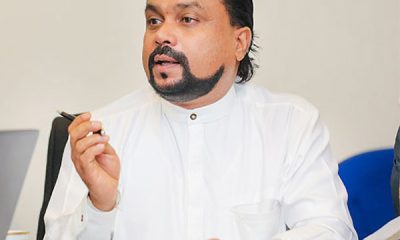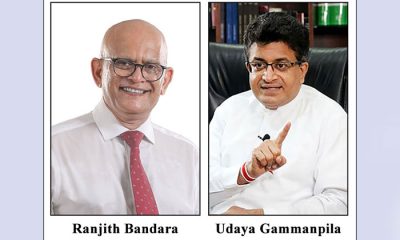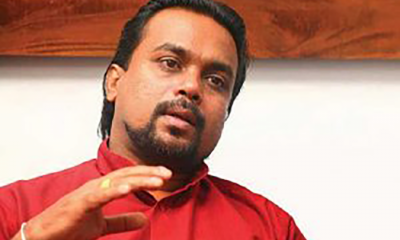Midweek Review
‘Nine: The Hidden Story’ FACT or FICTION

The government reaction to the police shooting at a violent protest at Rambukkana on April 19, 2022, undermined the overall security posture. Repeated US interventions, HRCSL (Human Rights Commission) action as well as the position taken by some members of the Bar Association demoralized the police and the military. That was the only death caused by police/military shooting during the entire protest campaign. Those who now question the failure on the part of the military on May 09 and July 09 conveniently forgot how the government responded to the Rambukkana shooting. Therefore, the decision on the part of the National Freedom Front (NFF) to present ‘Nine: The Hidden Story’ to the two daughters of the protester who died in the Rambukkana shooting surprised quite a number of people, including the writer, at the well-attended book launch.
By Shamindra Ferdinando
US Ambassador to Colombo Julie J. Chung tweeted: “I am disappointed that an MP has made baseless allegations and spread outright lies in a book that should be labelled ‘fiction’. For 75 years, the US and SL have shared commitments to democracy, sovereignty, and prosperity – a partnership and future we continue to build together.”
Ambassador Chung was responding to explosive accusations made by National Freedom Front (NFF) leader Wimal Weerawansa, MP, at the launch of ‘Nine: The Hidden Story’ at Sri Lanka Foundation on the evening of April 25. The American responded within 24 hours.
Displaying a 133 page book written in Sinhala, one-time minister Weerawansa discussed the US role in President Gotabaya Rajapaksas’s removal and their current strategy that involved some projects targeting Parliament. It must be noted that the US Ambassador must be having a super-fast translator to translate that book into English, in a matter of a few hours. Therefore, the bone of contention is whether the US, in fact, conducted the regime change operation as it had done elsewhere, as alleged by lawmaker Weerawansa.
Chung presented her credentials to the then President Gotabaya Rajapaksa at Janadhipathi Mandiraya on February 25, 2022, just over a month before public anger exploded, opposite the President’s private residence, at Pangiriwatte, Mirihana, possibly incited by interested parties, as happened in Libya, in the lead up to the staged ouster of Gaddafi by Western powers. President Rajapaksa was flanked by State Foreign Minister Tharaka Balasuriya and Gamini Senarath, Secretary to the President. But, by the time Chung took over the US mission here, the Gotabaya Rajapaksa administration was in serious trouble. The Rajapaksas quite wrongly felt that the situation could be somewhat stabilized by replacing Dr. P.B. Jayasundera, who functioned as the Secretary to the President.
Gamini Senarath was brought in on January 19, 2022. though President Gotabaya Rajapaksa preferred senior public servant Anura Dissanayake. This was disclosed by Derana Chief, Dilith Jayaweera, at one time, one of the closest associates of ousted President Gotabaya Rajapaksa, in a YouTube interview, with Eraj Weeraratne, recently.
By the time Chung succeeded Alaina B. Teplitz, the architect of the controversial deal with US-based firm New Fortress Energy, finalized close to midnight on September 17, 2021, the ruling Sri Lanka Podujana Peramuna (SLPP) was rapidly moving towards inflicting grave injury on the coalition. President Gotabaya Rajapaksa sacked Ministers Wimal Weerawansa and Pivithuru Hela Urumaya (PHU) leader Udaya Gammanpila on March 03, 2022, over their protests against the deal with the US firm. Weerawansa is on record as having alleged that they were sacked by President Gotabaya Rajapaksa at the behest of his brother Basil Rajapaksa, Minister of finance. Vasudeva Nanayakkara, who joined Weerawansa and Gammanpila to move the Supreme Court against the New Fortress deal, thereafter boycotted the Cabinet.
In the run-up to the Pangiriwatte flare-up, the United States’ notorious regime change guru, Under Secretary of State for Political Affairs Victoria Nuland. arrived in Colombo. Her delegation included Assistant Secretary of State for South and Central Asian Affairs Donald Lu, and Principal Deputy Assistant Secretary of Defence for Indo-Pacific Security Affairs Amanda Dory. Ambassador Chung joined the visiting delegation when a meeting took place with President Gotabaya Rajapaksa at the Presidential Secretariat on March 23, 2022.
The stage was set for an operation to oust President Gotabaya Rajapaksa. But, according to Weerawansa, National List MP Ranil Wickremesinghe, the UNP leader was not to be the beneficiary of the US project, according to the original plot hatched by them.
A clandestine meet
The crux of the matter is Weerawansa’s assertion that Chung put immense pressure on Speaker Mahinda Yapa Abeywardena to accept the Office of the President, consequent to President Gotabaya Rajapaksas’s resignation. Weerawansa declared that the US envoy visited the Speaker, unannounced, at his official residence, amidst protesters’ bid to take control of Parliament. The MP’s statement that the Speaker hadn’t been aware of Ambassador Chung’s arrival at his official residence, until she walked in, is astonishing.
Speaker Abeywardena never contradicted Weerawansa’s claim though Ambassador Chung swiftly and totally rejected Weerawansa’s work ‘Nine: The Hidden Story.’ Speaker Abeywardena, for some reason, remains stone silent so far, even though Weerawansa, at the book launch, acknowledged the possibility of the Matara District lawmaker denying his claim.
If MP Weerawansa lied through his teeth, as alleged by Ambassador Chung, why is Speaker Abeywardena remaining silent? Did the clandestine visit actually take place? Would Ambassador Chung have gone to the extent of assuring Speaker Abeywardena that he could assume presidency, contrary to the Constitution, without specific instructions/approval of the US State Department?
In case Speaker Abeywardena quickly denied MP Weerawansa’s claim, immediately after Ambassador Chung’s denial, or before Weerawansa’s book came out, it would have been thrown to the dustbin.
Those who dismissed MP Weerawansa’s shocking claims, pertaining to the US project here, should be concerned about Speaker Abeywardena’s response. If the Speaker remains silent, to protect a lawmaker propagating lies, the Matara District MP, too, should be held accountable for the destabilization caused.
Perhaps, one of the most exciting chapters dealt with the rapid developments that took place immediately after a disappointed Ambassador Chung left the Speaker’s residence. Having seen a contingent of over 100 Special Forces troops in the Speaker’s compound, a much agitated Speaker Abeywardena contacted the then Prime Minister Ranil Wickremesinghe, who was at Army Headquarters at Pelawatte, Battaramulla. Following consultations with Premier Wickremesinghe, Speaker Abeywardena had left the compound, from a gate in the rear, and sought refuge at Army headquarters where the PM and military top brass viewed aerial footage of the mayhem. Live drone coverage included footage of protesters setting Premier Wickremesinghe’s house, near Royal College, ablaze.
Did Speaker Abeywardena visit Army headquarters, on the evening of July 09, 2022, and subsequently moved to a safe location, close to the Ratmalana airport, provided by the Air Force, as claimed by MP Weerawansa?
As disclosed by MP Weerawansa, did Speaker Abeywardena issue all statements pertaining to President Gotabaya Rajapaksa’s resignation, and related matters, from the safe house, provided by the Air Force?
The government should respond to MP Weerawansa’s published allegations and set the record straight, if the NFF leader propagated lies. Actually, Speaker Abeywardena should have raised a privilege issue if a lawmaker pursued such a destructive political project, at the expense of Sri Lanka’s relations with the US. Regardless of accountability issues, raised by the US since the successful conclusion of the war, in May 2009, to Washington’s dislike. The US, however, did facilitate the destruction of the LTTE’s sea supply chain by divulging specific US intelligence on the positioning of floating LTTE arsenals, on the high seas, during the last phase of the war, that enabled the Navy to deliver a knockout blow to the Tigers, in international waters, at a crucial time for the overall combined forces fight to end the LTTE terror menace.
In case of a second print of ‘Nine: The Hidden Story,’ Weerawansa should examine whether Speaker Abeywardena had revealed Ambassador Chung’s sudden appearance, at his residence, on the evening of July 09, and the controversial offer made to install him as President of an interim administration, when he called Premier Wickremesinghe, from his official residence. If not, did Speaker Abeywardena brief Premier Wickremesinghe of the unexpected development when they met at Army headquarters shortly thereafter?
Speaker Abeywardena should unreservedly earn the respect of all Lankans for turning down the US underhand offer to facilitate a complete regime change. Regardless of whatever shortcomings and failures on his part, lawmaker Abeywardena thwarted plan ‘A’ designed to install an interim administration, under the Speaker’s leadership. For how long can Speaker Abeywardena remain non-committal as MP Weerawansa repeats accusations?
India’s role and plan ‘B’
Can MP Weerawansa substantiate accusations directed at New Delhi? The former JVP firebrand claim that India sought to replace Premier Mahinda Rajapaksa with Basil Rajapaksa in response to growing public protest campaigns cannot be taken at face value. Similarly, Weerawansa’s other unsubstantiated assertion that India declined to deploy an aircraft to take President Rajapaksa, and the first lady, out of Sri Lanka to their safety, consequent to the President’s refusal to sack Premier Wickremesinghe before he himself resigned, has to be proved. Weerawansa boldly claimed that India made its position clear to President Gotabaya Rajapaksa, through Sri Lanka’s Ambassador in Washington, Mahinda Samarasinghe, and High Commissioner in New Delhi, Milinda Moragoda. Regardless of the President’s refusal, Gamini Senerath, the then Secretary to the President, forwarded two letters -one the President’s resignation letter and the other that dealt with Premier Wickremesinghe’s removal – for approval. Did such a drama really take place? If Weerawansa propagated blatant lies, in a bid to cause further chaos, those who have been identified by name, as part of the US-India conspiracy, should contradict the NFF leader. It would be pertinent to mention that Samarasinghe and Moragoda represented in Parliament and served Cabinet-of-Ministers, under President Mahinda Rajapaksa, both notable turncoats after having crossed over from the UNP.
Weerawansa’s assumption that both the US and India wanted to thwart Wickremesinghe shouldn’t go uninvestigated. The plan ‘A’, designed to be implemented, envisaged an interim administration, under the leadership of Speaker Abeywardena. Field Marshal Sarath Fonseka, MP, has lambasted Weerawansa, in Parliament, for implicating him, as well as Chief of Defence Staff (CDS) General Shavendra Silva in the alleged conspiracy. Denying his role or that of the serving military in the alleged conspiracy to oust President Gotabaya Rajapaksa, the war-winning Army Commander questioned the very basis of the former Minister’s claims. Fonseka, who contested the 2010 presidential election, challenging his former Commander in Chief President Mahinda Rajapaksa, with the backing of the US, as revealed by Wikileaks, obviously attempted to denigrate Weerawansa by claiming to recall how subservient Weerawansa had been during the time he served as the Commander of the Army.
Weerawansa referred to Field Marshal by name when he addressed the gathering at the book launch, though the name was not mentioned in ‘Nine: The Hidden Story.’
India hasn’t responded to Weerawansa’s accusations. In fact, except for Ambassador Chung, the only other person to call MP Weerawansa a liar was Sarath Fonseka whose Army brought the LTTE down to its knees in May 2009. But, that wouldn’t have been possible without the extraordinary contribution made by the Navy and the Air Force, and the valiant sacrifices of the battle hardened soldiers, and their frontline commanders, who took the fight to the LTTE. We grant, as someone has said, Fonseka is the type of commander with a sixth sense that a country gets once in a thousand years, but it was wrong of him to claim the victory trophy, single handedly, after it was won by the sacrifices of so many.
Weerawansa has explained that in the wake of the US failure to convince Speaker Abeywardena to assume the leadership, the superpower, and India, were compelled to implement plan ‘B’ with Wickremesinghe. Perhaps a wider examination of the entire gamut of issues, beginning with the 2019 Easter Sunday carnage, is necessary to ascertain what is going on in the ‘land like no other.’
In hindsight it can be recalled that a section of the media jumped the gun and quite confidently, and conveniently, reported simultaneous resignations of President Gotabaya Rajapaksa and Prime Minister Ranil Wickremesinghe, on July 10, 2022. So how such clairvoyant reports did come to be written unless there were in fact a sinister plot in progress, but it buckled because of the decency of the Speaker and his commitment to do what is right?
Colombo based The Hindu correspondent Meera Srinivasan, in an online report, posted on May 10, 2022, and updated on the following day, headlined ‘Sri Lanka parties scramble to form all party govt,’ with strapline ‘Rajapaksas’ parliamentary majority, public anger with political class complicates exercise’ dealt with resignation of the President and the Prime Minister. Srinivasan declared that both the President and Prime Minister agreed to resign after party leaders asked for their resignations at a meeting chaired by Speaker Abeywardena. The Hindu correspondent added: “Party leaders met on Saturday in a discussion convened by the Speaker. They sought the immediate resignation of the President and the Prime Minister, agreed that Speaker Mahinda Yapa Abeywardena be made Acting President as per the Constitution, after which Parliament be convened to elect a President from among its members, to pave the way for an interim, all-party government. A flurry of political meetings followed on Sunday.”
Anurada Herath, in a report headlined ‘Speaker should become Acting President – Watagala’ posted on July 13, 2022, confirmed the push for Speaker Abeywardena’s elevation as the Acting President. JVP Central Committee Member, Attorney-at-Law Sunil Watagala was quoted as having said that if Premier Ranil Wickremesinghe has an iota of sense, he should not allow the political turmoil to drag on and instead should pave the way for the Speaker to become the Acting President.
Hong Kong flag on the protest ground
MP Weerawansa, in his foreword, disclosed hitherto unreported Chinese intervention to prevent the displaying of the Hong Kong flag at the Galle Face protest site, on May 09, 2022, the first day of the ‘Gota Go Gama’ campaign. Comparing the Maidan revolution, launched in Ukraine in February, 2014, with the Western project here, lawmaker Weerawansa questioned the displaying of the Hong Kong flag. Can the lawmaker substantiate his assertion that Western powers planned to unleash protest campaigns in Hong Kong in the wake of their Colombo operation.
Following the Chinese Embassy intervention, ‘Gota Go Gama’ organizers stopped the displaying of the Hong Kong flag.
Maidan violence, instigated by the US, followed a similar wave of protests, beginning November, 2013, when the then President Viktor Yanukovych refused to sign the European Union-Ukraine Association Agreement. Throughout the Maidan uprising, a protest camp occupied Independence Square in central Kyiv.
MP Weerawansa’s declaration that the Galle Face protest campaign should be examined taking into consideration Maidan uprising is of significant importance. The MP underscored the need to educate the younger generation of foreign-funded operations/agendas.
Weerawansa and those who really believe in the much touted conspiracy theory/theories should keep in their minds Gotabaya Rajapaksa’s administration created an environment conducive for such a devious project. ‘Gota Go Gama’ strategy relied on the ruination of the economy. Gotabaya Rajapaksa caused his own downfall and ruined the economy as a result of a spate of ill-advised, ill-fated, and reckless decisions.
Who really advised the President to change the country’s agriculture policy (April/May, 2021)? Overnight, in his capacity as the head of the Cabinet, President Rajapaksa banned the use of chemical fertilisers and other agro chemicals. The foolish decision on the use of chemical fertilisers, followed unprecedented tax cuts (November 2019). In between, Sri Lanka lost an opportunity to reach consensus with the IMF for a bailout package as a result of its decision to go ahead with an unprecedented tax cut that deprived the Treasury of as much as Rs 600 bn (March/April 2020) in vital revenue, at a very crucial time.
The economy couldn’t endure such short-sighted policies, particularly against the backdrop of the devastation caused by the April 2019 Easter Sunday carnage, followed by the Covid-19 pandemic.
However, Weerawansa refrained from speculating the possibility of external hand in influencing ill-fated decisions. Disclosure of an utterly corrupt decision to reduce Rs. 50 tax on a kilo of imported sugar to 25 cents, on October 13, 2020, too, contributed to President Gotabaya Rajapaksa’s downfall. The government fiercely defended it, both in and out of Parliament. Regardless of repeated assurances, the SLPP failed to pursue the Treasury bond scams perpetrated, in February 2015, and March 2016, thereby causing rapid erosion of public confidence. And, finally, unbridled corruption, at every level, and the pathetic failure on the part of the government to address accusations pertaining to the Easter Sunday massacre and the continuing China-Quad battle created the perfect environment for the President’s ouster.
Midweek Review
Batalanda and complexities of paramilitary operations
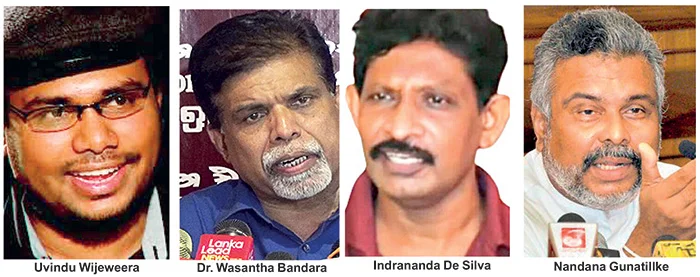
Former President Ranil Wickremesinghe’s recent combative ‘Head-to-Head’ interview with British-American Mehdi Hasan on Al Jazeera has opened a can of worms. As to why Hasan raised the Batalanda Presidential Commission report, during a 49-minute interview conducted at the London’s Conway Hall, with a clearly pro LTTE audience, remains a mystery. This must be yet another notorious way to show how even-handed they are as in the case of its coverage of Russia, China, Palestine or Ukraine for their gullible viewers.
Recorded in February and aired in March 2025, the interview is definitely the most controversial the UNP leader, who is also an Attorney-at-Law, ever faced during his political career; always used to getting kid glove treatment, especially after taking over the party in 1994.
The continuing public discourse on Batalanda should provoke a wider discussion on Sri Lanka’s response to separatist Tamil terrorism, since the cold blooded murder of Jaffna SLFP Mayor Alfred Duriappah, which signalled the beginning of the LTTE terror campaign that ended in May 2009 with the crushing military defeat of the Tigers on the banks of the Nathikadal lagoon, as well as two southern insurgencies in 1971 and 1987-1990.
As Nandana Gunatilleke (one time JVP General Secretary and ex-MP), Dr. Wasantha Bandara (ex-JVPer and close associate of the slain JVP leader Rohana Wijeweera), Indrananda de Silva (ex-JVPer, incumbent Central Committee member of Frontline Socialist Party [FSP] and ex-military photographer) and Uvindu Wijeweera (Rohana Wijeweera’s son and leader of Dewana Parapura) agreed during the recent Hiru ‘Balaya’ discussion, conducted by Madushan de Silva, the Batalanda operation was in line with the overall counter-terrorist/insurgency strategy of the then government.
The issues at hand cannot be discussed at all without taking into consideration the JVP terrorism that, at one-time, almost overwhelmed the UNP’s unbroken rule, since 1977, carried out while openly brushing aside most of the universally accepted genuine parliamentary norms. The country’s second Republican constitution, promulgated by the UNP regime with a 5/6 majority in Parliament, in 1978, had been amended no less than 13 times by the time they were finally ousted in 1995. This was mainly to facilitate their continuous rule. Unfortunately, all stakeholders have sought to take advantage of Batalanda, thereby preventing a proper dialogue. Quite surprisingly, none of the guests, nor the interviewer, bothered, at least, to make a reference to the JVP bid on President J.R. Jayewardene’s life in Parliament on the morning of July 18, 1987. At the time, JVPer Ajith Kumara, working in the House as a minor employee, hurled two hand grenades towards JRJ, with the then Prime Minister Ranasinghe Premadasa seated next to JRJ. While one government MP lost his life, several others suffered injuries, including then National Security Minister Lalith Athulathmudali, whose spleen had to be removed.
At one point, Gunatilleke declared that they assassinated UNP MP for Tangalle Jinadasa Weerasinghe on July 3, 1987, in response to the government killing well over 100 people, in Colombo, protesting against the signing of the Indo-Lanka accord on July 29, 1987. The parliamentarian was killed near the Barawakumbuka-Welangahawela bridge on the Colombo-Rathnapura-Embilipitiya Road. The UNPer was killed on his way home after having declined Premier Premadasa’s offer to make an SLAF chopper available for him to reach home safely.
Against the backdrop of MP Weerasinghe’s assassination and the grenade attack on the UNP parliamentary group that claimed the life of Keethi Abeywickrema (MP for Deniyaya), the government had no option but to respond likewise. The operation, established at the Batalanda Housing scheme of the State Fertiliser Corporation, constituted part of the counter-insurgency strategy pursued by the UNP.
Those who called Batalanda complex Batalanda torture camp/ wadakagaraya conveniently forgot during the second JVP inspired insurgency, the military had to utilize many public buildings, including schools, as makeshift accommodation for troops. Of course the UNP established Batalanda under different circumstances with the then Industries Minister Ranil Wickremesinghe providing political authority. Batalanda had been an exclusive police operation though the Army had access to it whenever a requirement arose.
Those who had been suddenly withdrawn from the Northern and Eastern Provinces, to meet the rapidly evolving security threat in the South, required accommodation. FSP CC member Indrananada de Silva had received unhindered access to Batalanda in his capacity as a military photographer and the rest is history.
As to why Indrananda de Silva switched his allegiance to the FSP should be examined, taking into consideration his previous role as a trusted military photographer, formerly a Lance Corporal of the Military Police. An influential section of the JVP, led by Kumar Gunaratnam, formed the FSP in April 2012 though it didn’t receive the much anticipated public support. Both Indrananda de Silva and Nandana Gunatilleke, who aligned himself with the UNP, found fault with the JVP-led National People’s Power (NPP) over its handling of the Batalanada issue.
Paramilitary operations
Paramilitary operations had been an integral part of the overall counter-insurgency campaign, directed at the JVP responsible for approximately 6,600 killings. Among those death squads were PRRA primarily drawn from the SLMP (Sri Lanka Mahajana Party) and SRRA (the socialist Revolutionary Red Army). PRRA had close links with the Independent Student Union (ISU) whose leader Daya Pathirana was slain by the JVP. The vast majority of people do not remember that Daya Pathirana, who led the ISU during the turbulent 1985-1986 period, was killed mid-Dec. 1989. The second insurgency hadn’t started at that time though the JVP propagated the lie that they took up arms against the UNP government following the signing of the Indo-Lanka peace accord on July 29, 1987.
In addition to PRRA and SRRA, the government made use of paramilitary groups, namely Kalu balallu, Ukkusso, Rajaliyo, Kaha balallu, Kola koti, Rathu Makaru, Mapila, Gonussa, Nee, Keshara Sinhayo, Le-mappillu and Kalu koti.
The UNP also involved some elements of Indian trained Tamil groups (not of the LTTE) in paramilitary operations. Such operations, that had been backed by respective Cabinet Ministers, were supervised by local law enforcement authorities. Paramilitary operations had been in line with psychological warfare that was meant to cause fear among the JVP, as well as the general population. Military operations that had been combined with paramilitary actions received the blessings of the political leadership at the highest level. In the case of Batalanda (1988-1990) President J.R. Jayewardene and Ranasinghe Premadasa knew of its existence.
Even after the eradication of the top JVP leadership, by Nov. 1989, police, military and paramilitary operations continued unabated. Former JVPers appearing on ‘Balaya’ agreed that counter-insurgency operations were actually brought to an end only after D.B. Wijetunga succeeded President Ranasinghe Premadasa after the latter’s assassination on May Day 1993.
After the LTTE resumed war in June 1990, just a couple of months after the withdrawal of the Indian Army (July 1987-March1990), the UNP authorized paramilitary operations in the northern and eastern areas. Members of TELO, PLOTE, EPRLF as well as EPDP were made part of the overall government security strategy. They operated in large groups. Some paramilitary units were deployed in the Jaffna islands as well. And these groups were represented in Parliament. They enjoyed privileged status not only in the northern and eastern regions but Colombo as well. The government allowed them to carry weapons in the city and its suburbs.
These groups operated armed units in Colombo. The writer had the opportunity to visit EPDP and PLOTE safe houses in Colombo and its suburbs soon after they reached an understanding with President Ranasinghe Premadasa. Overnight at the behest of President Premadasa, the Election Department granted these Tamil groups political recognition. In other words, armed groups were made political parties. The Premadasa government accepted their right to carry weapons while being represented in Parliament.
It would be pertinent to mention that thousands of Tamil paramilitary personnel served the government during that period. There had been many confrontations between them and the LTTE over the years and the latter sought to eliminate key paramilitary personnel. Let me remind you of the circumstances, the EPRLF’s number 02 Thambirajah Subathiran alias Robert was sniped to death in June 2003. Robert was engaged in routine morning exercises on the top floor of the two-storeyed EPRLF office, on the hospital road, Jaffna, when an LTTE sniper took him out from the nearby Vembadi Girls’ high school. The operation of the Norway managed Ceasefire Agreement (CFA) made no difference as the LTTE removed Robert who led the party here in the absence of leader Varatharaja Perumal, the first and the only Chief Minister of the North-Eastern Province.
In terms of the CFA that had been signed by Premier Ranil Wickremesinghe and LTTE leader Velupillai Prabhakaran, in Feb. 2002, the government agreed to disarm all paramilitary personnel. Many wouldn’t remember now that during Premadasa’s honeymoon with the LTTE, the Army facilitated the LTTE onslaught on paramilitary groups in selected areas.
Muthaliff’s role
During the ‘Balaya’ discussion, the contentious issue of who shot JVP leader Rohana Wijeweera came up. Nandana Gunatilleke, who contested the 1999 Dec. presidential election. as the JVP candidate, pointing to an article carried in the party organ that dealt with Wijeweera’s assassination said that he wrongly named Gaffoor as one of the persons who shot their leader whereas the actual shooter was Muthaliff. The headline named Thoradeniya and Gaffoor as the perpetrators.
Declaring that he personally wrote that article on the basis of information provided by Indrananda de Silva, Gunatilleke named Asoka Thoradeniya and Tuan Nizam Muthaliff of the Army as the perpetrators of the crime. Thoradeniya served as Sri Lanka’s High Commissioner in the Maldives during the Yahapalana administration, while Muthaliff was killed by the LTTE in Colombo in late May 2005. The shooting took place at Polhengoda junction, Narahenpita. Muthaliff was on his way from Manning town, Narahenpita, to the Kotelawala Defence University.
The programme was told that the JVP had over the years developed close relationship with Thoradeniya while Indrananda de Silva accused Dr. Wasantha Bandara of duplicity regarding Muthaliff. How could you recognize Muthaliff, slain by the LTTE, as a war hero as he was actually one of the persons who shot Rohana Wijeweera, the latter asked.
At the time of his assassination, Muthaliff served as the Commanding Officer, 1 st Regiment Sri Lanka Military Intelligence Corps. The then parliamentarian Wimal Weerawansa was among those who paid last respects to Maj. Muthaliff.
At the time of Rohana Wijeweera’s arrest, Muthaliff served as Lieutenant while Thoradeniya was a Major. Indrananda de Silva strongly stressed that atrocities perpetrated by the police and military in the South or in the northern and eastern regions must be dealt with regardless of whom they were conducting operations against. The former JVPer recalled the Army massacre in the east in retaliation for the landmine blast that claimed the lives of Northern Commander Maj. Gen. Denzil Kobbekaduwa and a group of senior officers, including Brigadier Wijaya Wimalaratne, in early Aug. 1990 in Kayts.
Dr. Wasantha Bandara warned of the Western powers taking advantage of what he called false narrative to push for a Truth and Reconciliation Commission.
It would be pertinent to mention that the LTTE also used the underworld as well as some corrupt Army personnel in planning high profile assassinations. Investigations into the assassination of Muthaliff, as well as Maj. Gen. Parami Kulatunga, killed in a suicide attack at Pannipitiya, in June 2006, revealed the direct involvement of military personnel with the LTTE.
Indrananda de Silva disclosed that soon after Anura Kumara Dissanayake won the presidential election last September, the FSP, in writing, requested the JVP leader to inquire into killings during that period, including that of Rohana Wijeweera. The FSPer alleged that President Dissanayake refrained from even acknowledging their letter. Indrananda de Silva emphasized that Al Jazeera never disclosed anything new as regards Batalanda as he exposed the truth years ago. The former JVPer ridiculed the ruling party tabling the Batalanda Commission report in the wake of Wickremesinghe’s Al Jazeera interview whereas the matter was in the public domain for quite some time.
Indrananda de Silva and Nandana Gunatilleke exchanged words over the latter’s declaration that the JVP, too, was subjected to investigation for violence unleashed during the 1987-1990 period. While the FSPer repeatedly declared that those who carried out directives issued by the party were arrested and in some cases killed, Nandana Gunatilleke took up the position that the party should be held accountable for crimes perpetrated during that period.
The interviewer posed Nandana Gunatilleke the question whether he was betraying his former comrades after joining the UNP. Nandana Gunatilleke shot back that he joined the UNP in 2015 whereas the JVP joined UNP as far back as 2009 to promote retired Army Chef Sarath Fonseka’s presidential ambition even though he wiped out the JVP presence in Trincomalee region during the second insurgency.
JVP’s accountability
Nandana Gunatilleke is adamant that the party should accept responsibility for the killings carried out at that time. The former JVPer declared that Vijaya Kumaratunga (Feb. 16, 1988), first Vice Chancellor of the Colombo University (March 08, 1989) Dr. Stanley Wijesundera, Ven. Kotikawatte Saddhatissa thera (Aug. 03, 1988) and Chairperson of the State Pharmaceutical Corporation Gladys Jayewardene (Sept. 12, 1989) were among those assassinated by the JVP. SPC Chairperson was killed for importing medicine from India, the former Marxist aligned with the UNP said, while actor-turned-politician Kumaratunga’s assassination was attributed to his dealings with President J.R. Jayewardene.
According to Nandana Gunatilleke, except for a few killings such as General Secretaries of the UNP Harsha Abeywickrema (Dec 23, 1987) and Nandalal Fernando (May 20, 1988), the vast majority of others were ordinary people like grama sevakas killed on mere accusation of being informants. The deaths were ordered on the basis of hearsay, Nandana Gunatilleke said, much to the embarrassment of others who represented the interest of the JVP at that time.
One quite extraordinary moment during the ‘Balaya’ programme was when Nandana Gunatilleke revealed their (JVP’s) direct contact with the Indian High Commission at a time the JVP publicly took an extremely anti-Indian stance. In fact, the JVP propagated a strong anti-Indian line during the insurgency. Turning towards Dr. Wasantha Bandara, Gunatilleke disclosed that both of them had been part of the dialogue with the Indian High Commission.
It reminds me of the late Somawansa Amarasinghe’s first public address delivered at a JVP rally in late Nov. 2001 after returning home from 12 years of self-imposed exile. Of the top JVP leadership, Somawansa Amarasinghe, who had been married to a close relative of powerful UNP Minister Sirisena Cooray, was the only one to survive combined police/military/paramilitary operations.
Amarasinghe didn’t mince his words when he declared at a Kalutara rally that his life was saved by Indian Premier V.P. Singh. Soft spoken Amarasinghe profusely thanked India for saving his life. Unfortunately, those who discuss issues at hand conveniently forget crucial information in the public domain. Such lapses can be both deliberate and due to negligence.
By Shamindra Ferdinando
Midweek Review
Independent Monitor
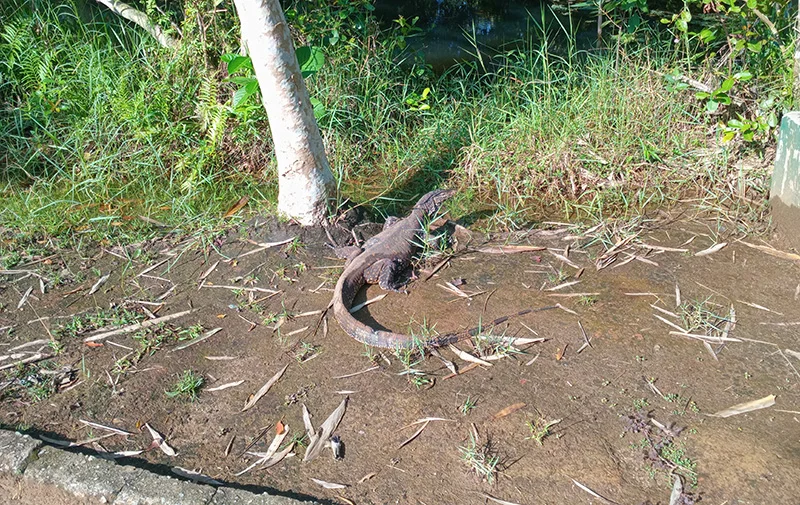
You may think sloth comes very easy,
To your kingly monitor of the shrinking marsh,
As he lies basking smugly in the morn sun,
But he is organized and alert all the while,
As he awaits his prey with patience infinite,
Free of malice, a professional of a kind,
His cumbrous body not slowing his sprite….
But note, he’s no conspirator spitting guile,
And doesn’t turn nasty unless crossed,
Nor by vengeful plans is he constantly dogged,
Unlike those animals of a more rational kind,
Whose ways have left behind a state so sorry.
By Lynn Ockersz
Midweek Review
Rajiva on Batalanda controversy, govt.’s failure in Geneva and other matters

Former President Ranil Wickremesinghe’s recent interview with Mehdi Hasan on Al Jazeera’s ‘Head-to-Head’ series has caused controversy, both in and outside Parliament, over the role played by Wickremesinghe in the counter-insurgency campaign in the late’80s.
The National People’s Power (NPP) seeking to exploit the developing story to its advantage has ended up with egg on its face as the ruling party couldn’t disassociate from the violent past of the JVP. The debate on the damning Presidential Commission report on Batalanda, on April 10, will remind the country of the atrocities perpetrated not only by the UNP, but as well as by the JVP.
The Island sought the views of former outspoken parliamentarian and one-time head of the Government Secretariat for Coordinating the Peace Process (SCOPP) Prof. Rajiva Wijesinha on a range of issues, with the focus on Batalanda and the failure on the part of the war-winning country to counter unsubstantiated war crimes accusations.
Q:
The former President and UNP leader Ranil Wickremesinghe’s interview with Al Jazeera exposed the pathetic failure on the part of Sri Lanka to address war crimes accusations and accountability issues. In the face of aggressive interviewer Mehdi Hasan on ‘Head-to-Head,’ Wickremesinghe struggled pathetically to counter unsubstantiated accusations. Six-time Premier Wickremesinghe who also served as President (July 2022-Sept. 2024) seemed incapable of defending the war-winning armed forces. However, the situation wouldn’t have deteriorated to such an extent if President Mahinda Rajapaksa, who gave resolute political leadership during that war, ensured a proper defence of our armed forces in its aftermath as well-choreographed LTTE supporters were well in place, with Western backing, to distort and tarnish that victory completely. As wartime Secretary General of the Government’s Secretariat for Coordinating the Peace Process (since June 2007 till the successful conclusion of the war) and Secretary to the Ministry of Disaster Management and Human Rights (since Jun 2008) what do you think of Wickremesinghe’s performance?
A:
It made him look very foolish, but this is not surprising since he has no proper answers for most of the questions put to him. Least surprising was his performance with regard to the forces, since for years he was part of the assault forces on the successful Army, and expecting him to defend them is like asking a fox to stand guard on chickens.
Q:
In spite of trying to overwhelm Wickremesinghe before a definitely pro-LTTE audience at London’s Conway Hall, Hasan further exposed the hatchet job he was doing by never referring to the fact that the UNP leader, in his capacity as the Yahapalana Premier, co-sponsored the treacherous Geneva Resolution in Oc., 2015, against one’s own victorious armed forces. Hasan, Wickremesinghe and three panelists, namely Frances Harrison, former BBC-Sri Lanka correspondent, Director of International Truth and Justice Project and author of ‘Still Counting the Dead: Survivors of Sri Lanka’s Hidden War,’ Dr. Madura Rasaratnam, Executive Director of PEARL (People for Equality and Relief in Lanka) and former UK and EU MP and Wickremesinghe’s presidential envoy, Niranjan Joseph de Silva Deva Aditya, never even once referred to India’s accountability during the programme recorded in late February but released in March. As a UPFA MP (2010-2015) in addition to have served as Peace Secretariat Chief and Secretary to the Disaster Management and Human Rights Ministry, could we discuss the issues at hand leaving India out?
A:
I would not call the interview a hatchet job since Hasan was basically concerned about Wickremesinghe’s woeful record with regard to human rights. In raising his despicable conduct under Jayewardene, Hasan clearly saw continuity, and Wickremesinghe laid himself open to this in that he nailed his colours to the Rajapaksa mast in order to become President, thus making it impossible for him to revert to his previous stance. Sadly, given how incompetent both Wickremesinghe and Rajapaksa were about defending the forces, one cannot expect foreigners to distinguish between them.
Q:
You are one of the many UPFA MPs who backed Maithripala Sirisena’s candidature at the 2015 presidential election. The Sirisena-Wickremesinghe duo perpetrated the despicable act of backing the Geneva Resolution against our armed forces and they should be held responsible for that. Having thrown your weight behind the campaign to defeat Mahinda Rajapaksa’s bid to secure a third term, did you feel betrayed by the Geneva Resolution? And if so, what should have the Yahapalana administration done?
A:
By 2014, given the total failure of the Rajapaksas to deal firmly with critiques of our forces, resolutions against us had started and were getting stronger every year. Mahinda Rajapaksa laid us open by sacking Dayan Jayatilleke who had built up a large majority to support our victory against the Tigers, and appointed someone who intrigued with the Americans. He failed to fulfil his commitments with regard to reforms and reconciliation, and allowed for wholesale plundering, so that I have no regrets about working against him at the 2015 election. But I did not expect Wickremesinghe and his cohorts to plunder, too, and ignore the Sirisena manifesto, which is why I parted company with the Yahapalanaya administration, within a couple of months.
I had expected a Sirisena administration to pursue some of the policies associated with the SLFP, but he was a fool and his mentor Chandrika was concerned only with revenge on the Rajapaksas. You cannot talk about betrayal when there was no faith in the first place. But I also blame the Rajapaksas for messing up the August election by attacking Sirisena and driving him further into Ranil’s arms, so that he was a pawn in his hands.
Q:
Have you advised President Mahinda Rajapaksa’s government how to counter unsubstantiated war crimes allegations propagated by various interested parties, particularly the UN, on the basis of the Panel of Experts (PoE) report released in March 2011? Did the government accept your suggestions/recommendations?
A:
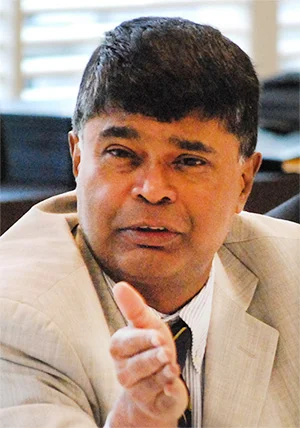
Prof. Rajiva Wijesinha
I kept trying, but Mahinda was not interested at all, and had no idea about how to conduct international relations. Sadly, his Foreign Minister was hanging around behind Namal, and proved incapable of independent thought, in his anxiety to gain further promotion. And given that I was about the only person the international community, that was not prejudiced, took seriously – I refer to the ICRC and the Japanese with whom I continued to work, and, indeed, the Americans, until the Ambassador was bullied by her doctrinaire political affairs officer into active undermining of the Rajapaksas – there was much jealousy, so I was shut out from any influence.
But even the admirable effort, headed by Godfrey Gunatilleke, was not properly used. Mahinda Rajapaksa seemed to me more concerned with providing joy rides for people rather than serious counter measures, and representation in Geneva turned into a joke, with him even undermining Tamara Kunanayagam, who, when he supported her, scored a significant victory against the Americans, in September 2011. The Ambassador, who had been intriguing with her predecessor, then told her they would get us in March, and with a little help from their friends here, they succeeded.
Q:
As the writer pointed out in his comment on Wickremesinghe’s controversial Al Jazeera interview, the former Commander-in-Chief failed to mention critically important matters that could have countered Hasan’ s line of questioning meant to humiliate Sri Lanka?
A:
How could you have expected that, since his primary concern has always been himself, not the country, let alone the armed forces?
Q:
Do you agree that Western powers and an influential section of the international media cannot stomach Sri Lanka’s triumph over separatist Tamil terrorism?
A:
There was opposition to our victory from the start, but this was strengthened by the failure to move on reconciliation, creating the impression that the victory against the Tigers was seen by the government as a victory against Tamils. The failure of the Foreign Ministry to work with journalists was lamentable, and the few exceptions – for instance the admirable Vadivel Krishnamoorthy in Chennai or Sashikala Premawardhane in Canberra – received no support at all from the Ministry establishment.
Q:
A couple of months after the 2019 presidential election, Gotabaya Rajapaksa declared his intention to withdraw from the Geneva process. On behalf of Sri Lanka that announcement was made in Geneva by the then Foreign Minister Dinesh Gunawardena, who became the Premier during Wickremesinghe’s tenure as the President. That declaration was meant to hoodwink the Sinhala community and didn’t alter the Geneva process and even today the project is continuing. As a person who had been closely involved in the overall government response to terrorism and related matters, how do you view the measures taken during Gotabaya Rajapaksa’s short presidency to counter Geneva?
A:
What measures? I am reminded of the idiocy of the responses to the Darusman report by Basil and Gotabaya Rajapaksa, who went on ego trips and produced unreadable volumes trying to get credit for themselves as to issues of little interest to the world. They were planned in response to Darusman, but when I told Gotabaya that his effort was just a narrative of action, he said that responding to Darusman was not his intention. When I said that was necessary, he told me he had asked Chief-of-Staff Roshan Goonetilleke to do that, but Roshan said he had not been asked and had not been given any resources.
My own two short booklets which took the Darusman allegations to pieces were completely ignored by the Foreign Ministry.
Q:
Against the backdrop of the Geneva betrayal in 2015 that involved the late Minister Mangala Samaraweera, how do you view President Wickremesinghe’s response to the Geneva threat?
A: Wickremesinghe did not see Geneva as a threat at all. Who exactly is to blame for the hardening of the resolution, after our Ambassador’s efforts to moderate it, will require a straightforward narrative from the Ambassador, Ravinatha Ariyasinha, who felt badly let down by his superiors. Geneva should not be seen as a threat, since as we have seen follow through is minimal, but we should rather see it as an opportunity to put our own house in order.
Q:
President Anura Kumara Dissanayake recently questioned both the loyalty and professionalism of our armed forces credited with defeating Northern and Southern terrorism. There hadn’t been a previous occasion, a President or a Premier, under any circumstances, questioned the armed forces’ loyalty or professionalism. We cannot also forget the fact that President Dissanayake is the leader of the once proscribed JVP responsible for death and destruction during 1971 and 1987-1990 terror campaigns. Let us know of your opinion on President Dissanayake’s contentious comments on the armed forces?
A: I do not see them as contentious, I think what is seen as generalizations was critiques of elements in the forces. There have been problems, as we saw from the very different approach of Sarath Fonseka and Daya Ratnayake, with regard to civilian casualties, the latter having planned a campaign in the East which led to hardly any civilian deaths. But having monitored every day, while I headed the Peace Secretariat, all allegations, and obtained explanations of what happened from the forces, I could have proved that they were more disciplined than other forces in similar circumstances.
The violence of the JVP and the LTTE and other such groups was met with violence, but the forces observed some rules which I believe the police, much more ruthlessly politicized by Jayewardene, failed to do. The difference in behaviour between the squads led for instance by Gamini Hettiarachchi and Ronnie Goonesinghe makes this clear.
Q:
Mehdi Hasan also strenuously questioned Wickremesinghe on his role in the UNP’s counter-terror campaign during the 1987-1990 period. The British-American journalists of Indian origins attacked Wickremesinghe over the Batalanda Commission report that had dealt with extra-judicial operations carried out by police, acting on the political leadership given by Wickremesinghe. What is your position?
A:
Wickremesinghe’s use of thugs’ right through his political career is well known. I still recall my disappointment, having thought better of him, when a senior member of the UNP, who disapproved thoroughly of what Jayewardene had done to his party, told me that Wickremesinghe was not honest because he used thugs. In ‘My Fair Lady,’ the heroine talks about someone to whom gin was mother’s milk, and for Wickremesinghe violence is mother’s milk, as can be seen by the horrors he associated with.
The latest revelations about Deshabandu Tennakoon, whom he appointed IGP despite his record, makes clear his approval for extra-judicial operations.
Q:
Finally, will you explain how to counter war crimes accusations as well as allegations with regard to the counter-terror campaign in the’80s?
A:
I do not think it is possible to counter allegations about the counter-terror campaign of the eighties, since many of those allegations, starting with the Welikada Prison massacre, which Wickremesinghe’s father admitted to me the government had engendered, are quite accurate. And I should stress that the worst excesses, such as the torture and murder of Wijeyedasa Liyanaarachchi, happened under Jayewardene, since there is a tendency amongst the elite to blame Premadasa. He, to give him his due, was genuine about a ceasefire, which the JVP ignored, foolishly in my view though they may have had doubts about Ranjan Wijeratne’s bona fides.
With regard to war crimes accusations, I have shown how, in my ‘Hard Talk’ interview, which you failed to mention in describing Wickeremesinghe’s failure to respond coherently to Hasan. The speeches Dayan Jayatilleke and I made in Geneva make clear what needed and still needs to be done, but clear sighted arguments based on a moral perspective that is more focused than the meanderings, and the frequent hypocrisy, of critics will not now be easy for the country to furnish.
By Shamindra Ferdinando
-
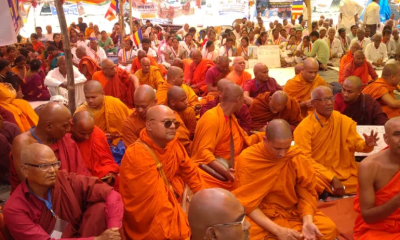
 Foreign News7 days ago
Foreign News7 days agoBuddhism’s holiest site erupts in protests over Hindu ‘control’ of shrine
-

 Features5 days ago
Features5 days agoCelebrating 25 Years of Excellence: The Silver Jubilee of SLIIT – PART I
-

 Business5 days ago
Business5 days agoCEB calls for proposals to develop two 50MW wind farm facilities in Mullikulam
-

 Business3 days ago
Business3 days agoAIA Higher Education Scholarships Programme celebrating 30-year journey
-

 Features5 days ago
Features5 days agoNotes from AKD’s Textbook
-

 Sports1 day ago
Sports1 day agoSri Lanka’s eternal search for the elusive all-rounder
-

 News2 days ago
News2 days agoGnanasara Thera urged to reveal masterminds behind Easter Sunday terror attacks
-

 News1 day ago
News1 day agoComBank crowned Global Finance Best SME Bank in Sri Lanka for 3rd successive year


